

In late April and early May, Russia saw a wave of drone attacks and crashes. Local governments across the country responded by banning the launch of unmanned aerial vehicles (UAVs), while the Moscow authorities ordered workers at Zhilishchnik, Avtodor, Mosgaz, and other utility companies, to look out for drones in the sky and suspicious objects on the ground.
Some firms, however, didn’t pay for the work, and their employees were forced on 18-hour shifts without having been instructed how to tell apart a drone from an airplane. The measure, which sought to increase security, saw police stations flooded with reports mistaking stars and glowing children’s toys for drones.
Content
Keeping an eye on the Kremlin
“The attics are welded shut, the basements are sealed”
18-hour shifts with no days off
Volunteers guard radioactive waste
Stars, toys, and Venus
Keeping an eye on the Kremlin
“My hands are frozen, but it's okay. It's getting a little warmer now. I've been sitting here since morning and will do so until the evening,” says Leonid. He introduces himself as an employee of the private security company KARAT-C. Stationed on the Bolshoi Moskvoretsky Bridge [the site of the killing of opposition politician Boris Nemtsov – The Insider], Leonid is accompanied by a thermos full of tea, an extension cord with a socket to charge his phone, and a folding chair with a view of the Kremlin’s Senate Palace, which was recently struck by a drone.
The attack took place on the night of May 3 to 4. Judging by the video circulated on social networks, the first drone flew over the Senate Palace at about 2:27 a.m., after which the roof of the palace caught fire. Sixteen minutes later, a second drone flew over the Kremlin, exploded over the roof of the Senate Palace, and crashed nearby. Locals in the center of Moscow wrote that they heard the sounds of explosions and saw sparks in the sky. According to them, the lights of the Kremlin and the Kremlin embankment were switched off. The attack on the Kremlin was the reason for increased security measures in Moscow, which saw Leonid taking his post on the bridge.

Leonid (name changed), a guard at a top Moscow private security firm, monitors the Kremlin
“Whether there’s any danger, I don't know – let's hope not. Everything’s fine so far,” Leonid replies when asked if he’s not afraid to be on duty after the attacks.
Leonid’s employer, the high-profile private security firm KARAT-C, regularly provided security to global celebrities and artists during their tours in Russia. The firm’s clients included Michael Jackson, Tina Turner, Paul McCartney, Elton John, Madonna, and many others. Russia's invasion of Ukraine put an end to most musicians’ tours, and KARAT-C’s guards have been brought in to monitor the Senate Palace. According to Leonid, the guards are paid “very well” for keeping an eye on the Kremlin, but how much the Kremlin itself pays the company is unknown. The guards were scheduled to be on duty up to and including May 9 – Victory Day. The shifts will most likely end soon: apparently, Muscovites no longer need to feel protected after the Victory Day parade – unless, of course, something extraordinary happens, says Leonid.
“The attics are welded shut, the basements are sealed”
“We were given a slingshot to shoot down a drone if we see one flying over us,” jokes a man in Mosgaz overalls. Along with a coworker, he guards a gas regulating station near Moscow’s Avtozavodskaya metro station. Both men were required to be on duty on May 7 and 9, and were instructed that they needed to monitor the sky and the surrounding area for suspicious people and objects – primarily drones and their operators. If they spotted one, they were supposed to take pictures and report it to the police.
“We have an object, we’re on duty for eight hours. Of course, we rotate – look, my replacement has arrived,” says the man. Unlike other utility firms, he doesn’t have to patrol the area – his tasks are limited to guarding Mosgaz property.
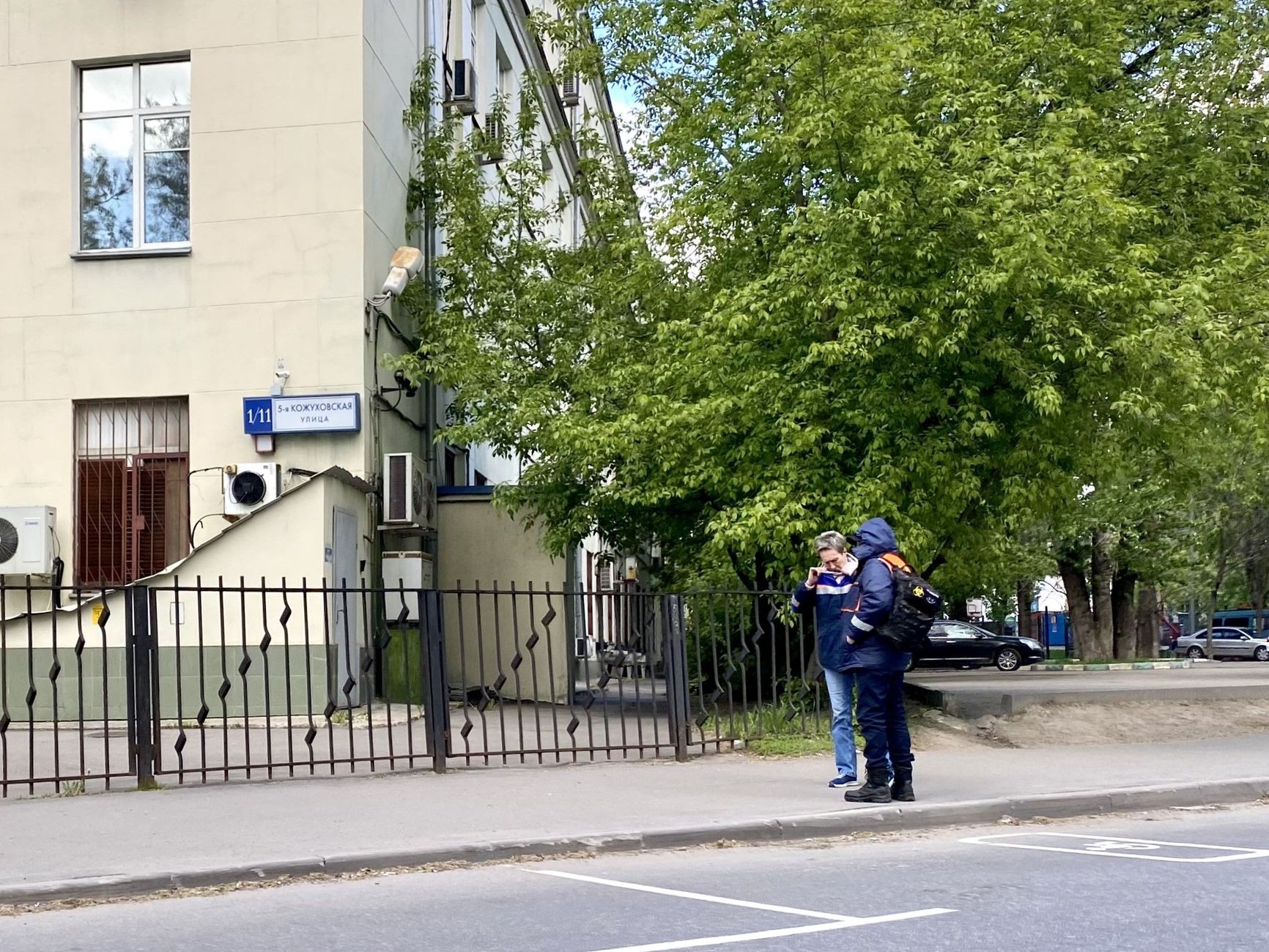
Mosgaz workers near Avtozavodskaya metro station
Guardians with red armbands on their sleeves stand across the street from Avtozavodskaya. People in overalls and yellow or orange vests are seen popping in and out of local courtyards. School and kindergarten staff are also involved in the patrols, and the issue has become the main talking point in district social media chatter.
“Everyone’s ears are pricked up, and everyone’s got their eyes peeled. They're on duty, looking at the sky and under their feet,” says an employees of a local kindergarten in a Maryino district chat room. “At the school, a security guard and a staff member make 25-minute rounds with flashlights every hour. The attics are welded shut, the basements are sealed.”
The color of the vest depends on the organization – patrol officers have to be in work uniforms. Some Telegram channels wrote that they should be on duty from 5 p.m. to 1 a.m., but government workers interviewed by The Insider said they began patrolling the streets early in the morning.
“We’re looking out for anything suspicious. If we see a drone, we call the police. No drones yet. But you are very suspicious!” says Boris, a MoszhilNIIproekt employee on duty in Moscow’s Pechatniki district. His bright yellow vest can be seen from afar. Boris’s employer, MoszhilNIIproekt, is a firm engaged in the design, overhaul and reconstruction of residential and commercial buildings in Moscow. According to Boris, him and his coworkers are on duty all day, 12 hour shifts at a time. They go in pairs. They could have refused, he says, but everyone agreed: management promised to pay double, as they would be working on their day off.
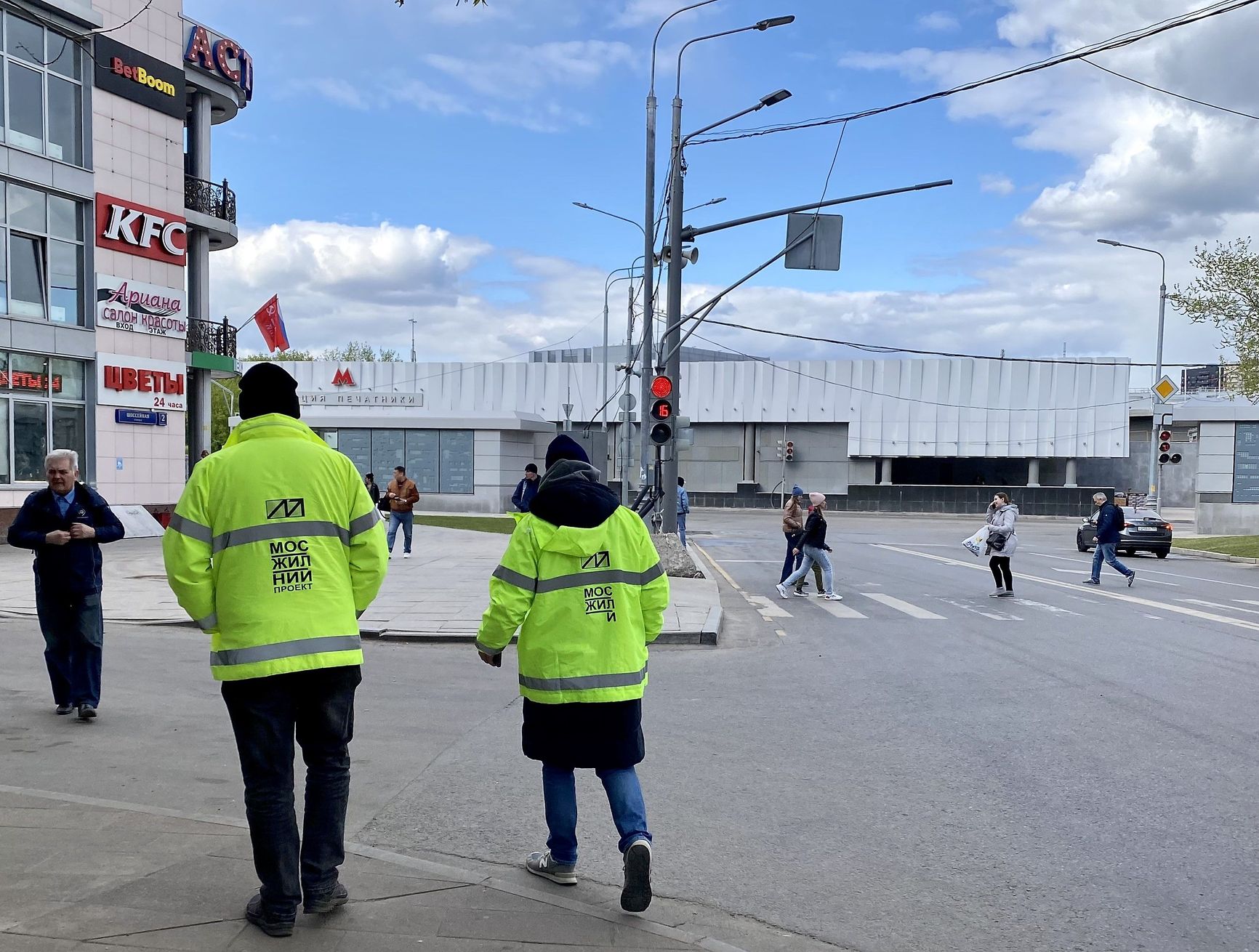
MoszhilNIIproekt employees near Pechatniki metro station
Employees from the Zhilishchnik utility company were less fortunate – they won’t be compensated for their extra work.
“How is it on duty? Hungry and cold! And we have another six hours to walk here,” says Andrei, a Zhilishchnik worker in Pechatniki. Together with his partner, he goes into a stall on Shosseynaya Street to buy shawarma and get warm. May in Moscow is cold: the temperature drops to -1 °C (30 °F) at night, and Andrei will have to guard the Pechatniki skies till late evening.
“No one will pay us for this. It's a pity, because today is our day off. You can't refuse. Well, only if there's a very good reason,” he complains to The Insider. According to Andrei, there was nothing suspicious in the area “apart from alcoholics” and a huge flock of pigeons near the local grocery store, Pyaterochka.

A municipal worker looks out for drones in Moscow’s Pechatniki district
“Flying rats, you don't need any biolaboratories here,” says Boris, alluding to a Russian Defense Ministry fake about Kyiv and Washington's joint experiments to create biological weapons using birds.
Other Zhilishchnik employees told The Insider that they will be compensated with extra days off, but there’s doubt that the firm will make good on the promise. None of the interviewed workers doubt that the government will likely take note of their free labor, and use it every holiday.
18-hour shifts with no days off
“It's very cold. They took us out at three in the morning, brought us back at half past four, and I've been on duty here ever since. They spread us out on bridges,” says a shivering Gulnara. She came from Kyrgyzstan, obtained Russian citizenship, and now works for the Gormost, a government-owned utility company. Management sent her to the Moskvorechye-Saburovo district, where an overpass over Kashirskoye Avenue and the notorious radioactive waste dump from the Moscow Polymetal Plant (MPP) are being built. The road is part of the South-Eastern Chord, an expressway still under construction. Despite it not being finished, workers were deployed on watch duty.
The conditions in which Gulnara works can hardly be called human – her shift lasts 18 hours, which she has to spend outside, looking for suspicious people and objects, especially drones in the sky. She was only given a brief description of what to look for, and has to stay on duty for four days: on May 2, May 4, May 7 and Victory Day. Gulnara is afraid to be photographed: “I'll be punished, I have to stay on the bridge all the time! I just came down to eat and get warm.”
She doesn’t know whether she’ll be paid any money, or whether she’ll get extra time off.
“What time off? We come back after being on duty, and we’re driven straight to work in our district!” – Gulnara says angrily.
Avtodor, another utility company, has a similar system – its employee Alexei is on duty not far from Gulnara. The conditions there are relatively more lenient: workers have to go on 14-hour shifts on watch, from 6:00 a.m. to 20:00 p.m. The shift counts as a working day, but instead of his usual duties, Alexei has to look out for drones.
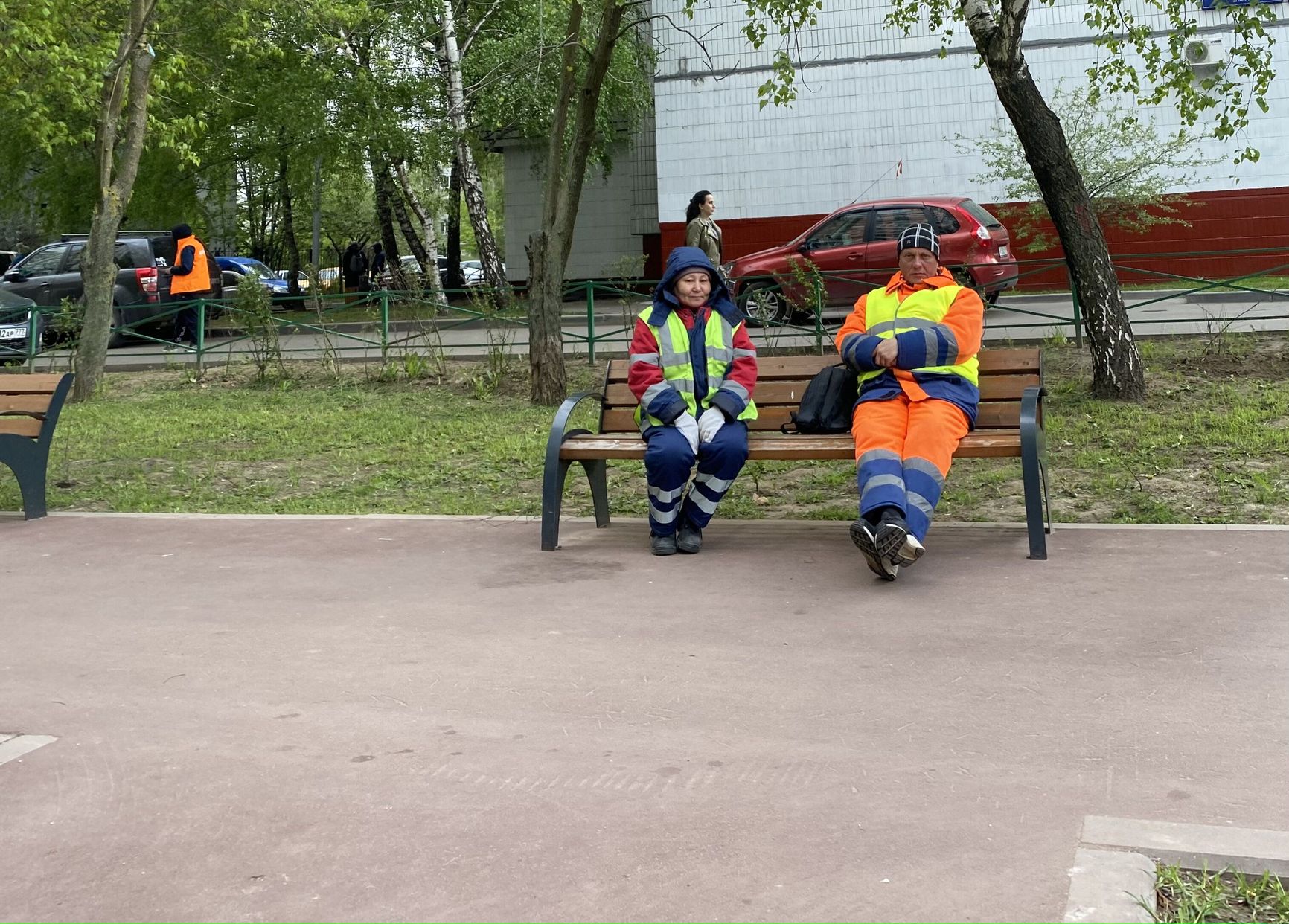
Avtodor employees in Moscow’s Tsaritsyno district
“We work shifts. What kind of time off do you think is possible here? And who’s going to [do the actual] work?” – Alexei reasons. He was expected to be coordinated by a local government worker, but the phone number he was given was wrong, and Alexei was unable to reach her. He himself lives in Moscow’s Shabolovskaya district. There, he says, residents have organized into action groups and are also on duty until one in the morning.
While we are standing with the men on duty in Moskvorechye-Saburovo, two more men in orange vests pass by. “It's the 47th bridge crew,” says Alexei. “You can tell them apart from the ones on duty by their helmets. They don't look up.”
Volunteers guard radioactive waste
“My child walks around with binoculars, looking around!” – says Svetlana (name changed), a resident of the Moskvorechye-Saburovo district, nodding at her son. “I’ve started looking at the sky more often myself.”
Some enthusiastic Muscovites were ready to volunteer to patrol for free, but they weren’t allowed to do so, being deemed “too active.” This was the case in Moskvorechye-Saburovo, the site of mass protests against the construction of the South-Eastern expressway via the Moscow Polymetal Plant's radioactive waste dump in 2019 and 2020. Locals simply call the place “the slope”: a steep bank of the Moscow River, where, according to government health watchdog Rospotrebnadzor, up to 60,000 tons of radioactive waste and radioactively contaminated soil are located.
“If something crashes there, there’ll be such an [explosion] that the whole of Moscow will be in trouble,” explains Svetlana, a local resident. Residential buildings are about 200 meters away from the “slope,” so the locals took the watch seriously. Aside from the MPP, where radioactive waste was previously decontaminated, Moskvorechye-Saburovo is home to several other nuclear enterprises, such as the VNIIKhT chemical research facility and MEPhI – Moscow’s National Research Nuclear University.
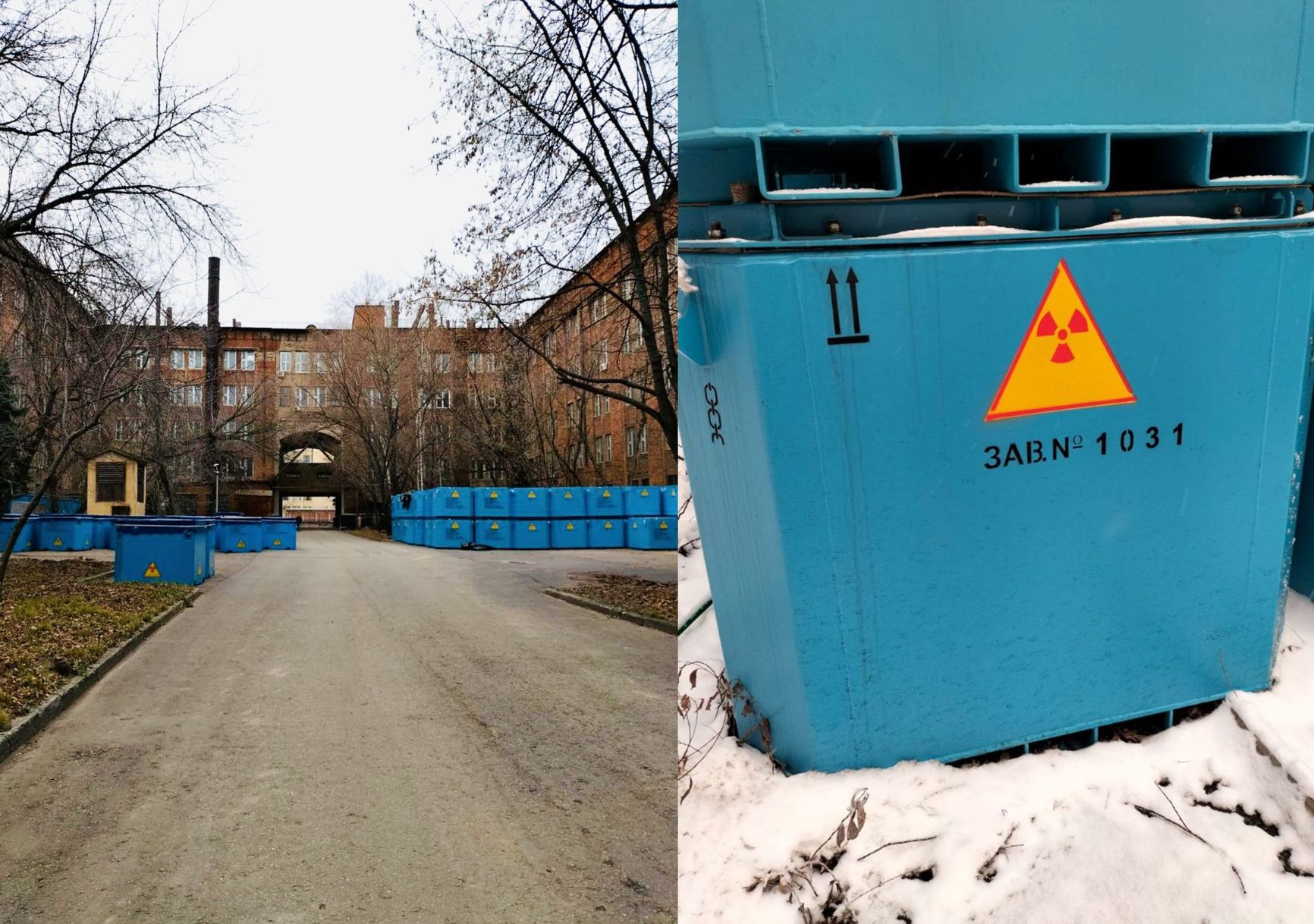
Radioactive waste containers near the VNIIKhT chemical research facility
Svetlana and Natalia volunteered to be on duty after the district administration asked the local Public Patrol Unit (PPU) to assist and find volunteers to track down drones, monitor attics, basements and perform “other tasks assigned in connection with the [so-called ‘special military operation’]”. Zhilishchnik and local government workers at first agreed to the task, and appointed a time and day – May 7. But on the evening of May 6, the district suddenly cancelled, saying that the activists aren’t needed anymore, and that no one will patrol the area – they will just take a couple of photos for the report.
“I got a phone call from an employee of the local government, with whom I discussed the patrol, and they said they didn’t need me on duty tomorrow. At 5 a.m. she’ll come to the police department, meet someone from Zhilishchnik, they’ll take photos for the report and go home,” Svetlana explains. “But we were going to be on duty for real, in good faith!” – she adds.
Svetlana was outraged, after which she received another call from the local authorities, being told that volunteers that want to go on patrol are “not listed,” the head of the PPU has no idea who they are, and that activists aren't generally needed.
“The fact is that we want to work, and they want to take pictures and go home. They’re afraid that we’ll control them. The district thought we were the same, but we’re cut from a different cloth. We’re all for honesty and integrity. Apparently, they were afraid of us,” Natalia complained.
Despite the conflict with the administration, the women still went on duty.
“We even bought red armbands. But we were told not to put them on, it would be regarded as something wrong, and it would end badly for us. Anything can be [considered a crime] these days,” says Svetlana.
Stars, toys, and Venus
After the anti-drone “watchdogs” went on duty, the number of UAV reports over Moscow increased tenfold, according to the Telegram channel VChK-OGPU. According to its source, the police recorded more than 200 reports in one day alone, with local departments simply unable to handle such a large number. At the same time, most of the reports are not specific and have nothing to do with UAVs. Cleaners, utility workers and district officials don’t know what a real drone looks like, and report anything that seems suspicious. According to the channel, a electric switch box on a high-rise building, stars, and children's toys have all been mistaken for a UAV.
“You can get an airplane and a drone mixed up. And get fined for doing so,” says a Zhilishchnik employee from Pechatniki. “People take pictures of stars and report [them to the police]. Everyone’s fixated on Venus, it’s a bright planet right now.”
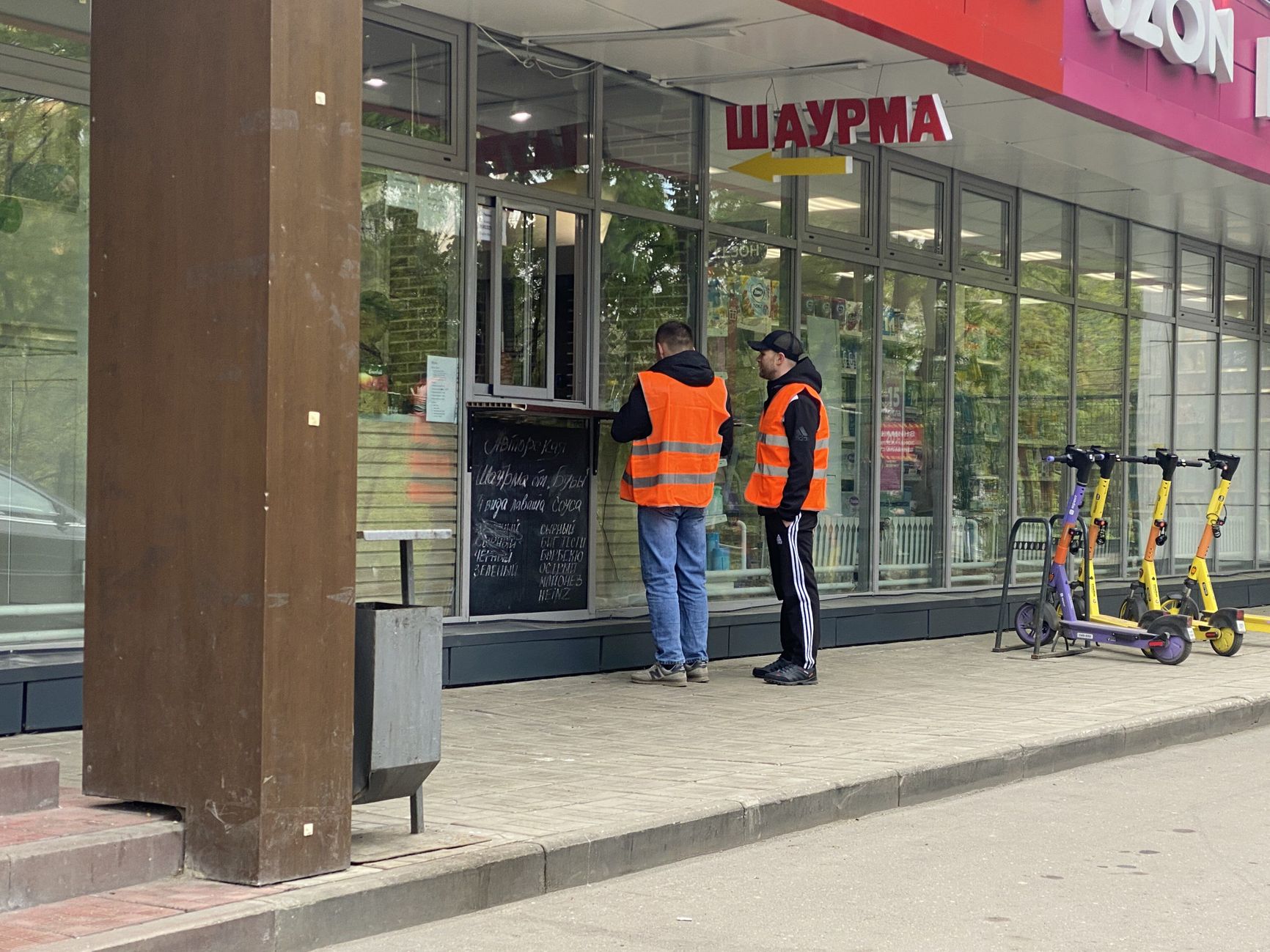
Zhilishchnik workers on duty
Of the confirmed UAVs that have been spotted, most turn out to be service drones that belong to the Moscow City Property Department, Russian Railways, government surveyors and Russia’s Emergency Services Ministry. Their flights have been permitted.
Total losses from the ban on drone operations in Moscow, Moscow Region and St.-Petersburg might amount to about 1.5 billion roubles ($18.8 million) if the ban lasts till the end of the year. Nikita Danilov, the CEO of private UAV rental firm Fly Drone, told Kommersant that the material damage from the ban could come in at 10 billion roubles ($125 million) in 40 regions across Russia.
A complete ban on the use of UAVs in Russia can roll back the market to levels last seen in 2018, experts believe. This measure is ineffective and cannot ensure safety. Moreover, it is often civilian drones that allow for the detection of crimes, such as the mining of railroad tracks being mined. On the other hand, civilian-grade drones can also be used to transport explosive devices. It remains to be seen what the Moscow mayor's office will do after May 9. One thing is clear: the fate of civilian drone aviation in Russia will largely depend on developments in Ukraine.
Other drone-fighting measures in Russia
Another anti-drone measure that the Moscow authorities adopted immediately after the attack on the Kremlin was the posting of signs banning drones across the city. Warnings about the inadmissibility of using drones printed on an A4 sheet of paper were hastily posted all over Moscow – on porches, poles, trash bins, parks, and playgrounds. The black and white printouts showed what drones look like, and urged people to report sightings of drones or their operators to the police.
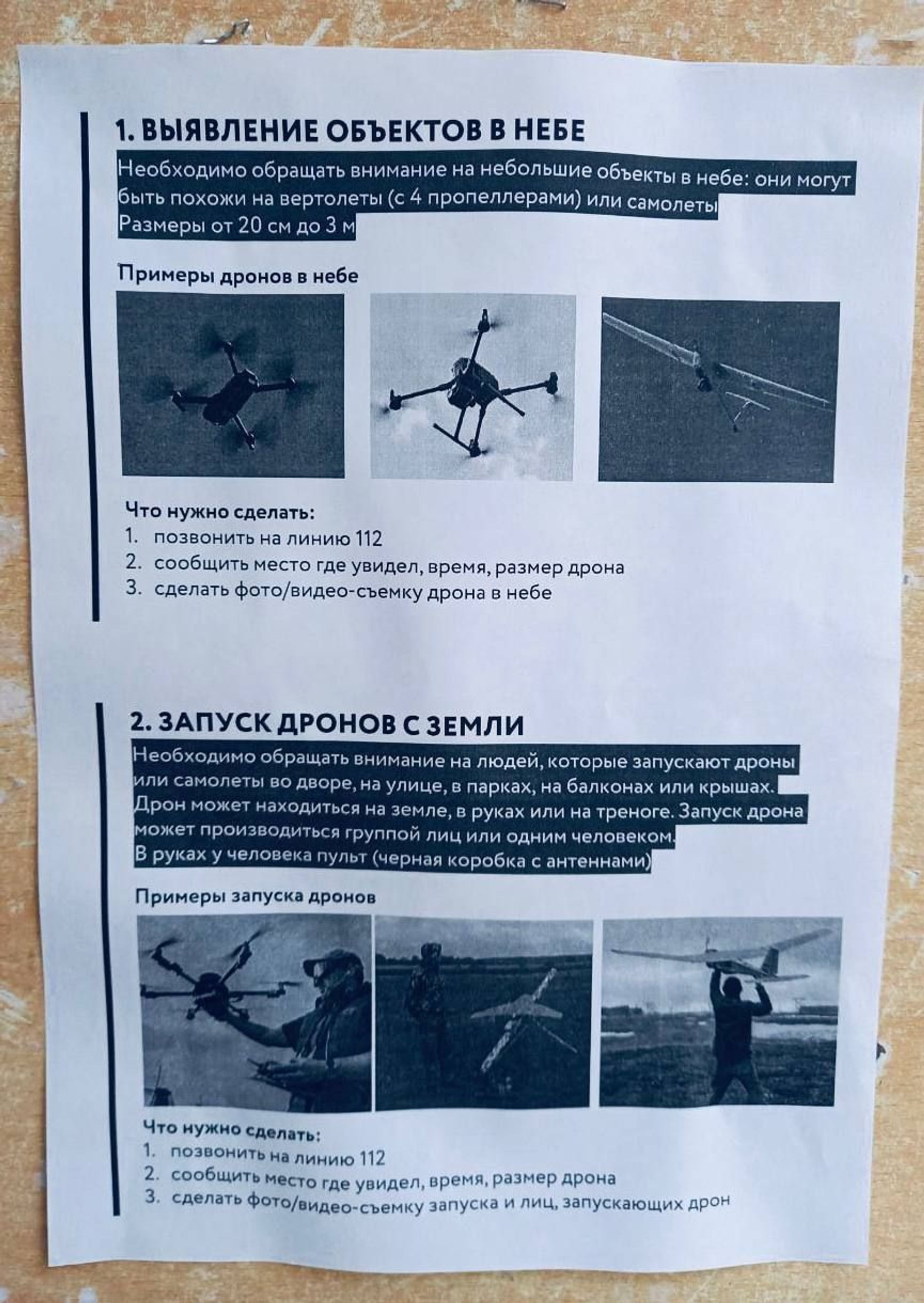
Similar signs had previously appeared in Zaryadye Park near Red Square, which has a clear view of the Kremlin and the Senate Palace. Posters with a crossed-out drone informed passers-by that they were in a “no-drone zone,” and warned of fines. Penalties for launching drones could come in at up to 50,000 roubles ($625) for individuals and up to 300,000 roubles ($3,750) for companies.
A drone operator can face criminal liability for violating Russia’s airspace, and be sentenced to a maximum of seven years in prison. In late April, a man who launched a drone in south-west Moscow became the subject of a criminal investigation, although the specific charges against him remain unclear. If law enforcement authorities believe that the launch of the UAV was carried out to search for information in the interests of a foreign state, the case may be requalified to treason or espionage.
The police can also seize drones for “verification” – even popular mass-produced civilian models. A device can be difficult to return if it is not properly registered, or if there are any other documentation-related issues.
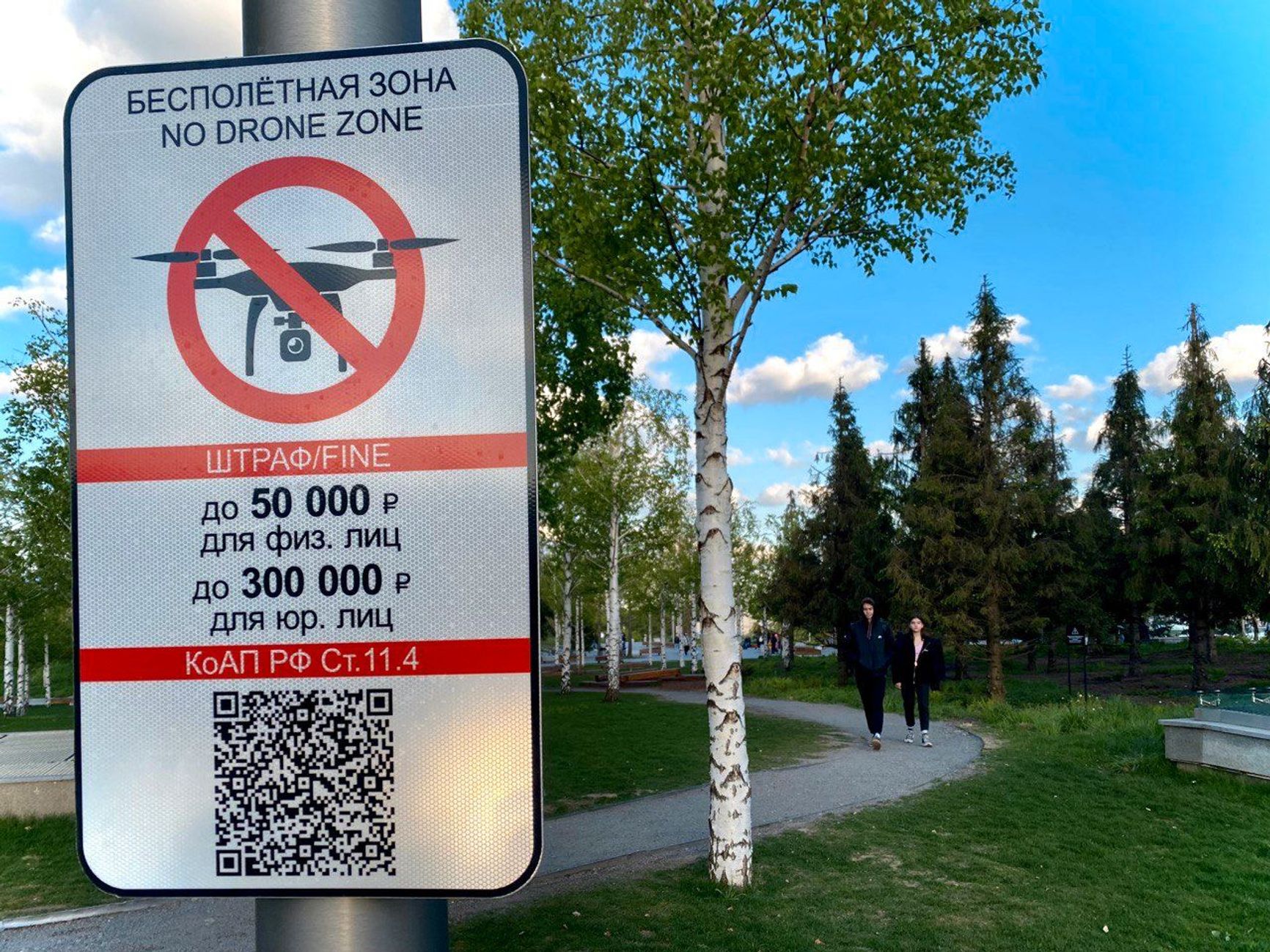
A sign warning of a “no-drone zone” in Moscow's Zaryadye Park
Since Russia's invasion of Ukraine, there have been regular reports of drones striking or crashing on Russian territory, but they became more frequent in late April. On the night of May 4, drones attacked oil refineries in the Krasnodar and Rostov regions. After the drone attacks on the Kremlin, riot squad personnel assigned to duty in Moscow’s Central District began being issued binoculars, according to a report by Telegram channel Baza. Apparently fearing another drone attack during the Victory Day parade, the Moscow authorities suppressed navigation services. GPS systems in Moscow’s central districts failed en masse. Carsharing companies reported that ride hailing was impossible throughout the city center, and trips could only be suspended – not completed. Booking cars in neighboring areas was possible, but they often couldn't be found, as their locations were scrambled. Searches in neighboring courtyards yielded no results, and bookings had to be canceled. Users reported vehicles “floating” in the Moscow River on their apps. Electric scooters were also affected by the signal jamming.
Yandex, GLONASS, Belka Car, Citydrive, as well as Whoosh and Citymobile users all reported geo-positioning errors.

Users reported vehicles “floating” in the Moscow River on their apps
State authorities began suppressing satellite navigation across the country at the end of February, when the number of drone attacks on Russian territory increased. According to data from GPSJam, which monitors the interference of navigation signals, the suppression initially appeared around Moscow, in several parts of the Volga region, as well as in Volgograd and Smolensk. By early March, the GPS signal suppression zone expanded to Ivanovo, Vladimir and Yaroslavl. By mid-April, it had reached the Ryazan, Kaluga and Tver regions. Strong interference was confirmed in the Samara region, as well as the Volgograd and Saratov regions, where military airfields in Marinovka and Engels are located.
It is difficult to call these measures effective. Drone sightings and attacks were reported throughout Russia’s May holidays – including those seen in Moscow. Only on the morning of May 10, at least five Russian regions confirmed drone attacks: a filling station of the Druzhba oil pipeline in the village of Sven was attacked in in the Bryansk region, and an air defense system shot down two drones near the village of Mekhovo in the Kaluga region. Two more UAVs attacked a military training ground in the Voronezh region. A UAV was spotted in the Kursk region, and two others were sighted in the Belgorod region, one of which “crashed into a power line and exploded,” killing a man with its debris. There is no official confirmation that these drones were Ukrainian. But one thing is clear: the most effective measure against them would be the end of the war and the withdrawal of Russian troops from Ukrainian territory.